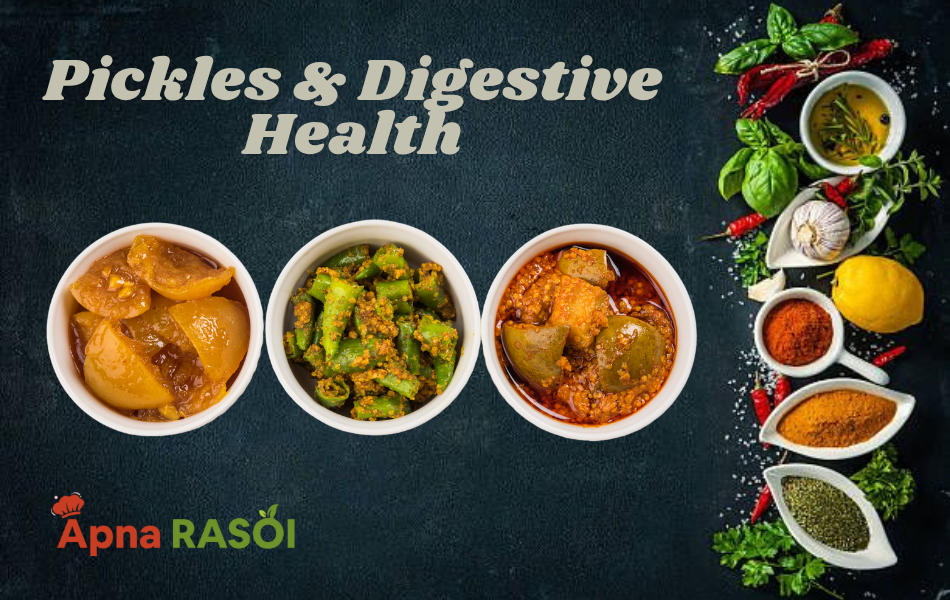
From lunchboxes to gourmet platters, pickles add more than just flavor to food. But did you know they can also affect your digestive system – sometimes in surprisingly good ways? The secret lies in fermentation, probiotics, and how your body reacts to this tangy treat. Let’s unpack the connection between pickles and gut health, and explore how you can use pickles for digestion.
In this post, we explore the powerful connection between pickles and digestive health, focusing on homemade, preservative-free pickles. Discover how naturally fermented pickles can support gut health, improve digestion, and boost your overall well-being.
Not all pickles are created equal – and their effects on digestion depend on how they’re made.
Fermented pickles, which are made through natural microbial processes (not vinegar brine), are rich in probiotics – live beneficial bacteria that support gut health. These pickles can enhance digestion by balancing your gut microbiome, which plays a key role in breaking down food, absorbing nutrients, and even regulating immunity.
On the other hand, non-fermented pickles – the ones preserved in vinegar and salt – don’t offer the same probiotic benefits. They still contain fiber and acidity that might aid digestion slightly, but without live cultures, their gut-boosting power is limited.
Fermentation is nature’s way of preserving food while adding a health bonus. When fruits or vegetables are fermented in a saltwater solution (brine), good bacteria – especially Lactobacillus – begin to thrive.
This process breaks down natural sugars and starches in the food, producing lactic acid, which gives fermented pickles their signature sour taste and creates an environment where harmful bacteria can’t survive.
The result? A pickle packed with gut-friendly microbes and enhanced digestive benefits.
Fermented pickles are like tiny jars of digestive gold because they naturally contain probiotics – live, beneficial bacteria that support your gut. Some of the key microbes found in these pickles include:
In simple terms, these probiotics act like helpful roommates in your digestive system – cleaning up, protecting, and improving how your body handles food from the inside out.
These good bacteria contribute to:
But a word of caution: these benefits only come from raw, unpasteurized, fermented pickles – not the mass-produced vinegary ones found on most store shelves.
If you’re aiming to use pickles for digestion, here’s what to look for:
1. Fermented Cucumber Pickles (Salt-Brine Based): These are rich in probiotics and easy to make at home. Look for labels that say “naturally fermented” or “contains live cultures.”
2. Kimchi: A Korean staple made from fermented cabbage, garlic, and spices. It’s a powerhouse of probiotics and fiber.
3. Sauerkraut: Fermented cabbage rich in enzymes and good bacteria. A spoonful a day can be a digestive game-changer.
4. Homemade Indian-style Fermented Pickles: Made without vinegar, using mustard oil, spices, and sun fermentation – especially mango pickle, lime, or garlic pickle varieties.
5. Beet or Carrot Ferments: Colorful, crunchy, and loaded with microbial goodness and digestive enzymes.
Avoid: Vinegar-based pickles, those with added preservatives, sugar, or artificial colors – these are not gut-friendly and don’t carry probiotic benefits.
So, are pickles good for digestion? The answer is a qualified yes – fermented pickles can absolutely support gut health. They deliver natural probiotics, aid nutrient absorption, and help maintain a balanced digestive system.
However, not all pickles are gut-friendly. To reap the full digestive benefits of pickles, opt for raw, unpasteurized, naturally fermented versions without vinegar or additives.
Incorporating these kinds of pickles into your diet – even a tablespoon a day – can make a meaningful difference in your gut health. Combine them with other gut-friendly foods like yogurt, bananas, whole grains, and fiber-rich veggies for optimal results.
Your gut is home to trillions of microbes – and a few good pickles might just be the tasty tenants it needs!
Share this post:
Welcome to APNA RASOI, where you can get naturally created, delicious, and nutrient-dense food products. Your go-to place for freshly created, lovingly crafted food products.
We are so excited to share our love of organic and homemade food products with you, and we sincerely hope you enjoy every bite!
Copyright 2024© Apna Rasoi. All rights reserved.
